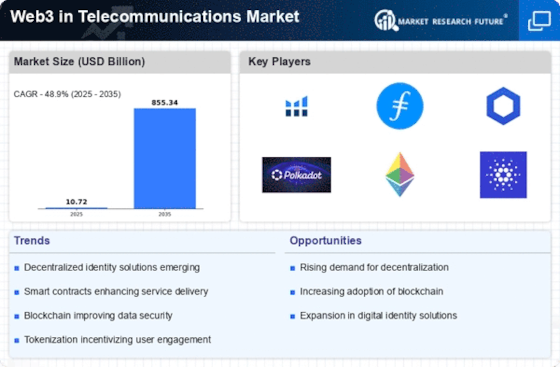Top Industry Leaders in the Web3 in Telecommunications Market

Competitive Landscape of Web3 in Telecommunications Market: A Disruptive Transformation
Web3, the nascent iteration of the internet characterized by decentralization, blockchain technology, and user-centricity, is poised to disrupt the established telecommunications (telecom) landscape. This emerging space presents lucrative opportunities and fierce competition, necessitating a detailed examination of the key players, strategic approaches, and market dynamics.
Key Players:
- Filecoin
- Web3 Foundation
- Zel Technologies Limited
- Livepeer Inc
- Brunswick Corporation
- Helium Systems Inc
- Kusama
- Polygon Technology
- Kadena LLC
- Ocean Protocol Foundation Ltd
Strategies Adopted:
-
Decentralized Mobile Network Operators (DMNOs): This strategy envisions creating autonomous, community-owned mobile networks powered by blockchain. Helium and T-Mobile's collaboration showcases the potential of DMNOs for efficient network management and reduced operational costs. -
Web3 Enabled Services: Telecoms are exploring Web3 to offer innovative services like secure IoT data monetization, tamper-proof supply chain management, and personalized loyalty programs. -
Data Monetization Platforms: By utilizing blockchain for secure data sharing and ownership control, telecoms can create platforms for users to monetize their data directly, fostering a more equitable data ecosystem. -
Metaverse Integration: Telecoms are positioning themselves as infrastructure providers for the metaverse, offering secure connectivity solutions and exploring opportunities for virtual network ownership and monetization.
Factors for Market Share Analysis:
-
Technological Advantage: Companies with advanced blockchain capabilities and robust Web3 development expertise will hold a competitive edge. -
Regulatory Compliance: Navigating the evolving regulatory landscape and adhering to data privacy regulations will be crucial for market success. -
Ecosystem Partnerships: Building strong partnerships with other key players in the Web3 ecosystem, including device manufacturers, content creators, and service providers, is essential for widespread adoption. -
Customer Value Proposition: Clearly articulating the value proposition of Web3 services and demonstrating tangible benefits for consumers will drive market adoption.
New and Emerging Companies:
-
Filecoin: Decentralized storage network offering secure and cost-effective data storage solutions for telecoms. -
Celo: Blockchain platform designed for mobile-first usage, aiming to provide affordable and accessible Web3 services for telecom customers. -
Polkadot: Interoperable blockchain network facilitating collaboration between different Web3 applications, potentially enabling seamless integration of diverse telecom services.
Current Company Investment Trends:
-
Venture Capital: VC firms are actively investing in promising Web3 startups focused on telecom applications, recognizing the disruptive potential of Web3 in the industry. -
Internal R&D: Leading telecoms are establishing dedicated R&D teams to explore Web3 opportunities and pilot innovative projects. -
Strategic Partnerships: Collaborations between telecoms and Web3 companies are becoming increasingly common, accelerating knowledge sharing and joint venture initiatives.
Latest Company Updates:
November 2023- The South Korean telecommunications company SK Telecom (SKT) has unveiled plans to introduce a Web3 wallet service called T wallet. This will be done in collaboration with the layer-1 blockchain network Aptos Labs and the company Atomrigs Lab. Through this three-way partnership agreement with the blockchain firms, SKT intends to grow its affiliations with mainnets and decentralized apps that its customers prefer. The goal is to launch T wallet to provide wallet services on blockchains that SKT customers want to use.
September 2023- Fliggs Mobile has recently launched as a fully digital Web 3 mobile virtual network operator (MVNO). The company utilizes Moflix, which they say is uniquely capable of converging mobile services with Web3. Through a partnership with Hedera, an open-source enterprise-grade public network, Fliggs can integrate a suite of Web3 services into their mobile app. By combining a mobile subscription and super app, Fliggs aims to offer a straightforward and secure entry point to Web3. Their goal is to make cutting-edge technologies affordable and available to all users. With their mobile-centric approach, Fliggs strives to simplify access to the latest advancements like Web3.
May 2023- China Telecom, a state-owned company, has partnered with blockchain company Conflux to develop a Blockchain SIM (BSIM) card. This SIM card can store blockchain wallet keys and digital signatures. Storing the keys on the physical SIM card reduces the risk of malware theft. The BSIM card appears identical to a normal SIM card but has 10-20 times more storage capacity. It also has dozens of times more computing power, enabling key pair generation and storage directly on the card. By keeping the sensitive cryptographic data on a secure physical chip, the BSIM card aims to improve blockchain wallet security compared to storing keys only on mobile device memory. The enhanced storage and computing abilities allow advanced blockchain features not possible on conventional SIM cards.










